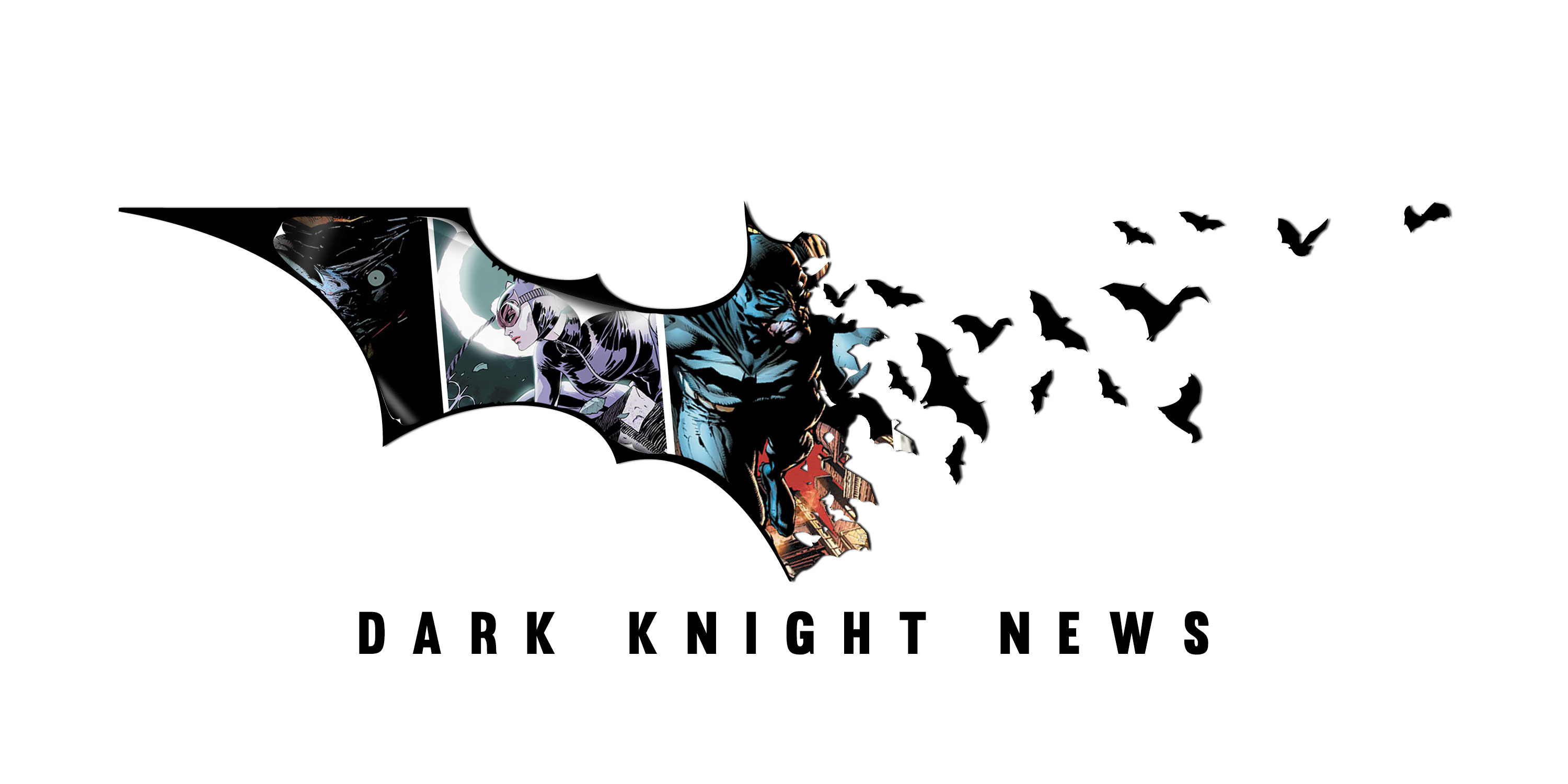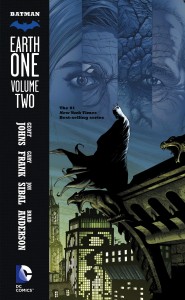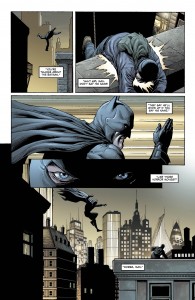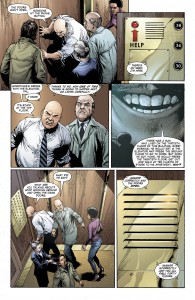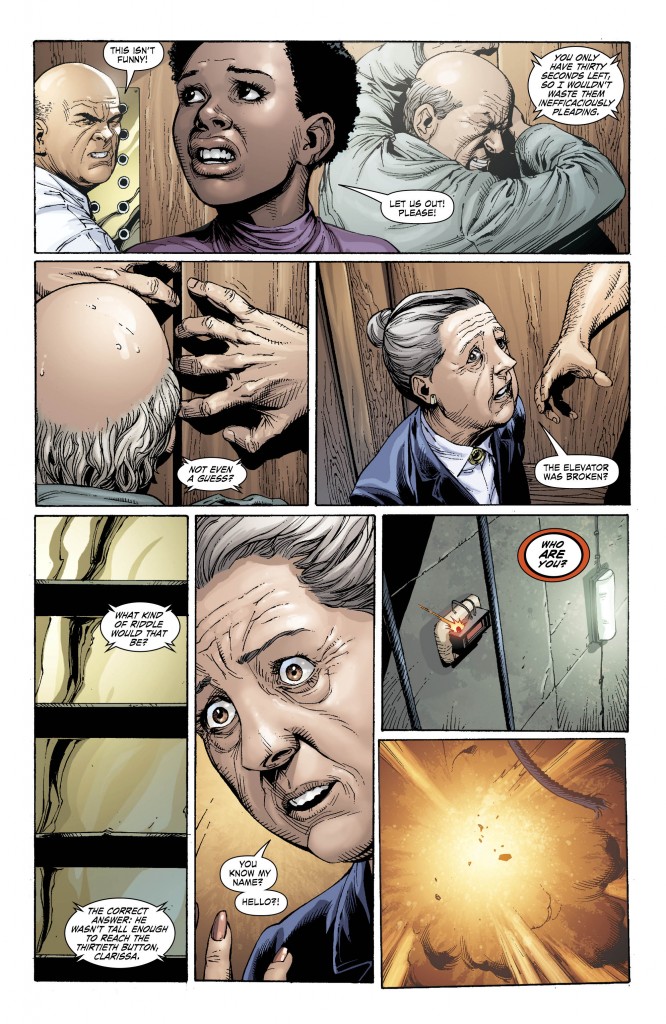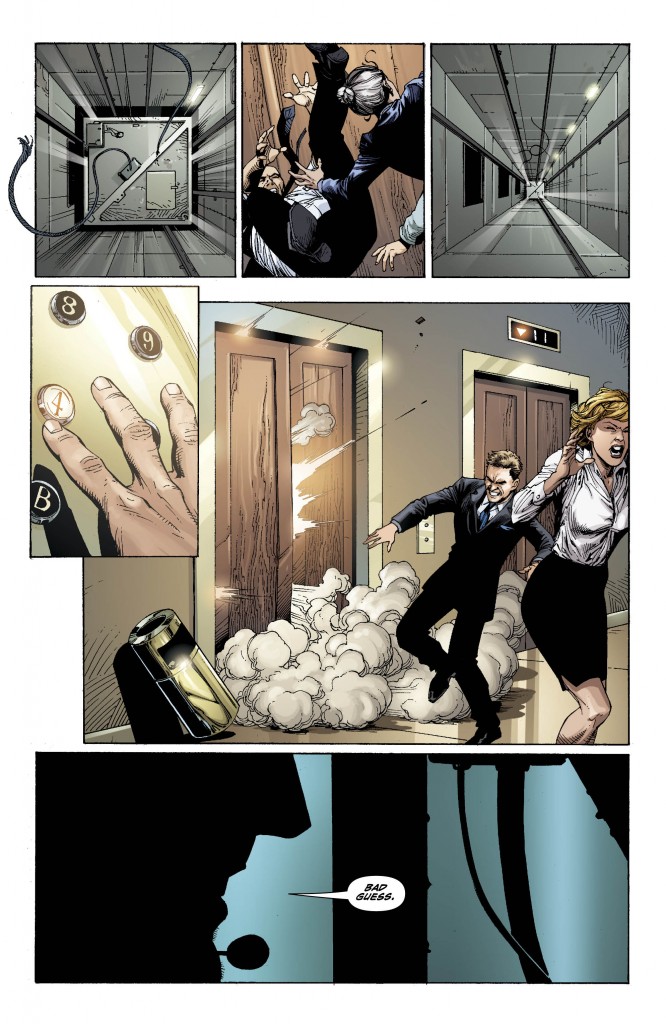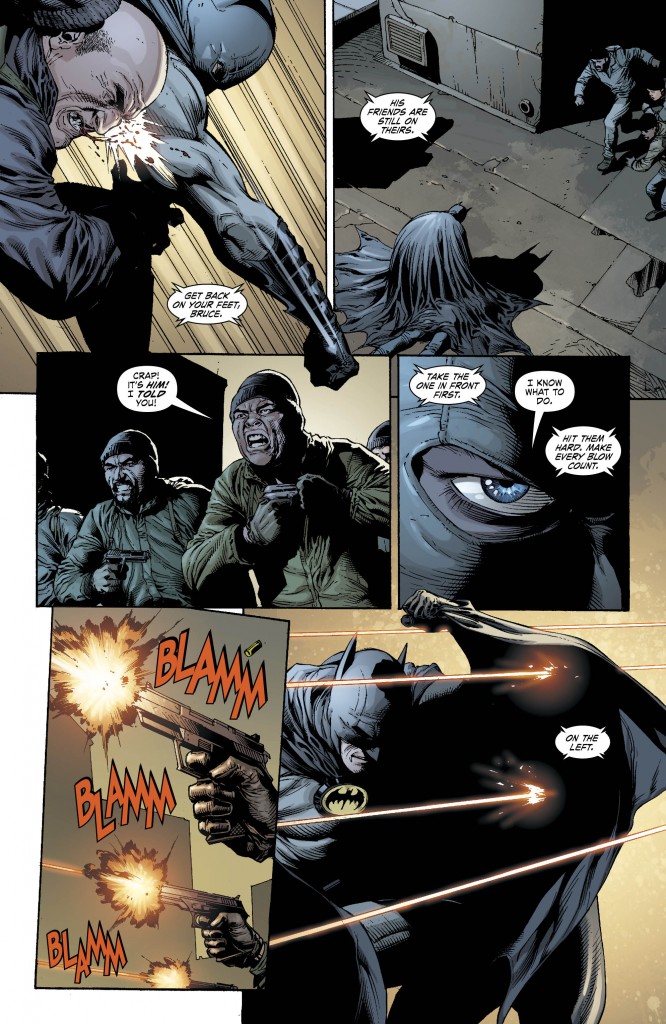The highly anticipated graphic novel Batman: Earth One, Volume 2 is now available in stores everywhere. Penned by one of my favorite writers, Geoff Johns (Green Lantern, Aquaman), and illustrated by Gary Frank (Superman, Shazam!), whom I consider to be THE definitive Superman artist of this era, the sophomore outing from the Batman hailing from the universe next door delivers a most riveting read full of surprises without sacrificing what makes Batman, well, Batman (read my review here). Any Batman fan looking for the next definitive read starring The Dark Knight is well advised to pick up a copy.
I recently had the privilege of discussing the book with the men behind it. You can read a transcription of that conversation below and feast your eyes on some preview pages.
DKN: With the first volume being described as “Beta Batman,” can you tell us where Batman/ Bruce Wayne finds himself at the beginning of Volume 2?
Geoff Johns: Sure, I think he’s still definitely a different kind of Batman in this one. This journey in Volume 2, he’s found a direction that’s gone from a singular mission that is all about himself to a mission that’s about Gotham City. And in this one, he goes from a creature learning the physical attributes he’s gonna need to take on the bigger mission to the intellectual one and truly evolve into a detective. So we wanted to challenge him in a different way. He’s not so much “Beta Batman” as a different type of Batman now. I think he’s learned a lot both in Volume 1 and especially in Volume 2 about how much it’s gonna take and what it’s gonna take to accomplish what he believes is the right thing: helping Gotham City and spreading that sense of justice throughout Gotham City. We get that sense that his mission’s just starting to get finalized and he’s gonna expand that in Book 2.
DKN: An observation of mine was that the villains in Volume 1 were a little more grounded, if you could call them that, and Volume 2 saw the rise of the supervillain. Would you agree with that?
GJ: I think so. We play more with that in subsequent volumes, but maybe it’s the rise of, in the wake, the vacuum of this corruption that controlled (Gotham) the people are vying for power and the Riddler’s one of those first people. Before Gotham can kind of heal itself from the wounds of Cobblepot’s reign, there’s gonna be people trying to occupy that space and Bruce is gonna have to take them down both by himself and with some help. This is the first challenge, I guess.
DKN: Gary, what went into designing the new Batsuit and visually reinterpreting classic characters?
Gary Frank: Taking the Batsuit first, the approach that we’ve had in the beginning is that Batman is not dressing as Batman. He’s not got a Batman suit, he’s not a superhero, he doesn’t regard himself as a superhero… this is kind of a guy building this thing that he wants to become or what he is becoming whether he wants to or not. The approach with the design is very much one of… I’m not thinking in terms of spandex. I’m not thinking of anything too traditional. He’s just assembling these things he’s building this costume from. He’s got a mask which roughly conforms to what we expect. The eyes are obviously (exposed) which makes a better connection between the reader and the character. It’s a man in there. It’s a man wearing a mask rather than Batman being a living, breathing entity in and of itself. It’s a guy in a mask. He’s got laces on his shoes when we first see him in the first issue and wrinkles around the elbows. It looks like fabric, it looks like something put together… the suit becomes more refined and less amateurish. So that’s the decision making process behind that. That was established in the beginning, so we’re just a couple of steps further along from that.
Regarding the rest, it’s a book about people. Batman is a man. Croc is a man. And so, we’re not kind of doing cartoon characters. We’re not doing monsters or anything like that. We’re doing people, that kind of informs the look. Once that’s established, you have that to proceed from. Hopefully they’ll feel coherent and part of the story.
DKN: Geoff, Earth One can be seen as somewhat of a sandbox. What is your approach to reimagining characters?
GJ: There’s so many great Batman stories and there’s so many great Batman stories being published right now – Batman’s great, Detective’s great – there’s a lot of wonderful things being done with Batman. And there have been a lot of wonderful things done with Batman in the past: The Dark Knight Returns, Year One, The Long Halloween, so many great books out there on top of the movies. You know, Burton’s original movie, all of Chris Nolan’s films, The Animated Series. (There are) so many brilliant Batman stories out there.
Gary and I really talked about if we’re gonna do Batman, we’re gonna create Batman from the ground up. We’re gonna do a different type of Batman, a different type of Gotham and all those characters within Batman’s world. It had to be something that would both stay true to who the characters are but also be different because if were were just gonna regurgitate other stories and use villains the same way they always have and make Batman the same Batman he’s always been in other books, I think it wasn’t gonna be successful experience for us creatively. And we really work for the audience, the readers. So we really looked at this and reinventing it. You know, I love reinventing characters. I really get a joy from it. Like when Gary and I worked on Shazam!, that was really fun. Or reintroduced Brainiac or Legion of Superheroes or even Superman himself, all that stuff. It’s a lot of fun to take the character and reinvent it.
Because it’s Batman it’s very different… it takes a long time to crack into who they are (the characters) and what we’re gonna do. That includes Batman, Alfred, Jim Gordon, Harvey Bullock, Harvey Dent, and adding new characters like Jessica Dent, who I really love as a character and to me makes a lot of sense. She’s an important character to our stuff. The characters like Croc and eventually all these other characters we’re talking about and we know are coming up. It’s for us both to surprise readers but not changing things to change them. Our goal is for the story to be a journey for Bruce Wayne. He’s learning not only to become a better Batman, but a better Bruce Wayne and a more robust human being. It’s a story of recovery from the loss of his parents. Clearly, he’s building a family around him and connecting to people.
If you look at Harvey Bullock and Jim Gordon, there’s a real bond that’s being built there between those two guys. It’s sometimes antagonistic, but there’s a lot of care between them. The same goes for Bruce and Jim, Alfred and Bruce. Even in this volume, you see a surprising bond form that I don’t think you’d expect between two characters. We need to stay true to those characters, but at the same time, we really want them to be different because the story calls for something different. This story does have a beginning, middle, and an end. This journey of Bruce Wayne does have an end. Every character that’s introduced has to have some kind of emotional access point to Bruce and challenge him in a different way. So a character like Croc in this represents a lot of what Bruce is and what Batman is. There’s a lot of questions about identity in our second volume that both point to Bruce and Batman and point to all the other characters. Who are they? What do they really want? The answers may surprise you. That’s the whole push for us when we’re reinventing these characters is the the challenge of staying true to them so they don’t feel completely new. It’s not like Batman has heat vision and that Croc can control crocodiles and wants to rule the world. There’s things that get really cartoony and comic book-y and what we’re trying here is to ground these characters in like, I don’t want to say a realistic Gotham because I think sometimes people can misinterpret that as gritty and dark, but an emotional place where things feel real. Where characters behave in real complex ways and the emotional underpinnings behind the characters are very complex. Croc is an incredibly complex character. Bruce is incredibly complex. Alfred ‘s complex.
We have the pages, the space, and the freedom; it’s not bound to continuity or things that have happened before. To really explore those things, hopefully in a way that engages people in a surprising fashion than they’re used to in other Batman stuff. This is all subjective: people can read our take on certain characters and they can say “oh, they’re wrong,” but to us this is the world and the way they are in the Batman: Earth One universe. We considered every possibility. Again, there’s so much great material out there and how do we want our book to stand next to it? We want ours to really live and breathe and grow.
DKN: I’m sure that you have ideas for the next volume and several seeds were planted in this one. Is there anything you’re willing to tease for the next installment?
GJ: We’re working on it right now. If you read Volume 2, there’s things that spill over into Volume 3.
GF: The important thing is the progression. Each individual book, while you can read them on their own, we’re going somewhere with this. We’re not going to ask for five or six or seven books. It’s not going to be “this character is going to appear in the next one and this character is going to appear in the next.” It’s about the character of Batman and those people around him and their development. So this is a story with a beginning, a middle and and end. It’s hard to say without giving away where it’s going.
DKN: I’d like to thank Geoff and Gary for their time. One more thing: Geoff says “hi” to his native Michigan!
Images courtesy of DC Entertainment.
